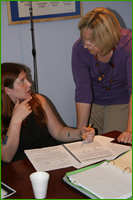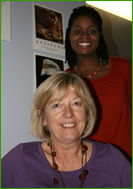
Contributed by Louisa Lambregts
Centre for Organizational Learning
Algonquin's Academic and Career Entrance Certificate Program Reaches Out to the Community
It took me two drives around the block to find the John Howard Society building. Tucked away on Old St. Patrick Street near the Market, the unassuming location understates its importance to the community. It is here that individuals can find much needed help to get a foot hold in life -- including Algonquin College's Academic and Career Entrance (ACE) Certificate program.
Offered through the Career and Academic Access Centre, the ACE program covers English, Math, and Science prerequisite college courses and is recognized as grade 12 equivalency.
 A version of ACE, ACElinks brings the program to the community. It allows individuals not able to do coursework at the College to complete work in a supported environment close to home. Most courses are delivered at two locations – at the John Howard Society and at Heartwood House on Chapel Street - with the exception of intermediate math and science classes, which are taken at Algonquin.
A version of ACE, ACElinks brings the program to the community. It allows individuals not able to do coursework at the College to complete work in a supported environment close to home. Most courses are delivered at two locations – at the John Howard Society and at Heartwood House on Chapel Street - with the exception of intermediate math and science classes, which are taken at Algonquin.
In particular, ACElinks helps students who want to pursue post-secondary but face multiple challenges in their lives. Challenges such as transportation, finding daycare, health, lifestyle issues, and job schedules can stand in the way of these individuals who wish to continue their education.
Helen Mildon, an Algonquin professor who is the ACElinks instructor for the program, describes the program as a bridging experience in many regards. "Students get used to learning and studying again while working through courses needed to apply to college. In the meantime, they have support from partner organizations to deal with life challenges that may interfere with their progress."
Students are gradually transitioned into the College environment. They complete math and science courses at the College after having completed some English and computer courses through ACE Links. They also come to the Learning Resource Centre to learn how to use the library and do research for an assignment.
Transitioning to college
According to Odette Regimbal, Chair of the Career and Academic Access Centre, the ACElinks program has been a tremendous success. There are students who have transitioned from ACElinks to studying full-time at Algonquin. "These students would not likely have come to College," says Regimbal, "without the transitional experience of ACE". It is a way for the non-traditional student to get to college. "The curriculum is just as hard as what is delivered on campus; the environment is just more conducive to their success. The whole experience builds self-confidence and basic skills so that eventually, they will come to Algonquin. It is an example of doing it their way."
The ACElinks program started in January, 2006. It is led by Algonquin College in partnership with the John Howard Society, ALSO (Alternative Learning Styles and Outlooks), and People, Words and Change. The initiative receives funding from the Ministry of Training, College and Universities. "It is a partnership that is working extremely well" says Regimbal. "The downtown location is ideal -- it is close to busing and parking. It is also a very welcoming environment. Students are well supported."
A very special relationship with the students
Regimbal also acknowledges that much of the success is attributable to Helen Mildon. "It takes a special person to make the impact that she does." Helen's students and co-worker agree.
Wendy Reid, ACELink's job coach and program coordinator at the John Howard Society, says that Helen has a very special relationship with the students. "She wants these students to succeed and these students know that. She's so excited about learning and ignites that in the students." Helen is caring, but she is also tough. "She has high expectations. Each student has to rise to Helen's challenges and they respect this."
As a teacher within this context, your approach has to be flexible. In Helen's view, "the teacher must be able to size up the gaps in a student’s knowledge and learning strategies. It’s about helping them to make connections and gain confidence in their ability to learn. Many of the students haven't had a great experience with formal education."
The focus is just as much on learning how to learn as it is on delivering the content. More often, it involves confidence building and reinforcement of basic success strategies.
Teaching success skills that are grounded in reality 
"Academically, I know where each student is at -- what their challenges are. It's different for everyone." Helen pinpoints these issues, and talks about them with each student. She will then tailor the program to each individual, paying special attention to what they need in order to be successful. Some students, for instance, may suffer from test taking anxiety. Strategies are discussed and the student learns how to work through this.
As Mildon describes it: "The focus is on success strategies that are grounded in reality and reflect the challenges they face. Academic learning is one part of it. It's also about teaching independent learning skills, self-awareness and problem-solving skills. It's about how to deal with challenges - the key skills that anyone needs to have to succeed in College and in life. We also try to instill resilience to change and a mindset that they can go to college and get a job".
An important goal is to help students overcome fears so that they "know what to do when they bump against barriers".
Course assignments involve looking at things realistically and learning how to handle challenges. For instance, an English assignment for one student may be to read articles to identify strategies that will help them cope with the dual role of being both a parent and a student. Others research information on topics that will help other students – such as how to get a job in the public service with an office administration diploma, or how to stretch your dollars by capitalizing on your Algonquin Student Card discounts.
A community of support
There is a lot of community support available to help students make progress. Wendy constantly meets with students to talk about their goals and work out a plan that best meets their needs.Lynn Hardwick-Howes from the Academic Referral Centre at Algonquin visits every few months to help the students plan for further studies. Life issues that demand immediate attention can be dealt with on site or at neighbouring agencies. The John Howard Society building has on-site services including support for finding housing and employment services. ACElinks students at Heartwood House can register their young children in a daycare run by ALSO, one of the partner agencies. While improving their academic skills, students can work on developing strong parenting skills.
When visiting Helen and Wendy, you can sense how intensive and busy this environment can be. For them, seeing the lights go on is very rewarding. "There is such talent here in these students," says Mildon. "It's amazing to see this emerge."